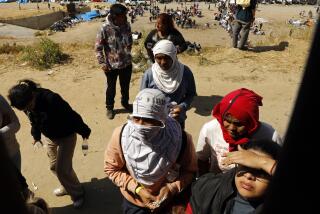Philippines Opens Door and Hope to Vietnam Migrants
- Share via
PALAWAN ISLAND, Philippines — On that February day when police came to the refugee camp to round up Nguyen Thi Gai and her children for forced repatriation to Vietnam, her husband was away fishing. En route to the transit center, all she could do was mumble incoherent prayers.
“I didn’t know what to do, so I just prayed and prayed that we wouldn’t be separated, that I would see my husband again, and that we wouldn’t be forced back,” the 36-year-old woman recalled, blinking back tears at the memory.
She was quiet for some moments before continuing softly: “For many years, that’s all that I know to pray for, that we wouldn’t be sent back to Vietnam.”
Her prayers were answered that day. For reasons that remain a mystery to her, Nguyen and her six children were returned to the Palawan refugee camp even as 88 others were pushed onto a plane heading back to their native country.
Now her most cherished wish--not to be forced back at all--apparently has become a reality.
According to the Roman Catholic Church-based Center for Assistance to Displaced People, the Philippine government on Monday will agree to let 1,800 Vietnamese asylum-seekers, who for eight years have been living in the camp here, stay in the Philippines permanently if they choose.
The church-run organization has promised to care for and help resettle those who do not want to return to Vietnam.
Of the five governments holding 31,000 Vietnamese migrants in refugee centers, Thailand, Malaysia and Indonesia have begun to deliver the refugees back to Vietnam, while Hong Kong has until June 1997. The Philippines, with its strong Catholic influence, stands alone in its refusal to force the migrants to go home.
“Those who are not willing to go home, we are willing to host them,” said Bishop Ramon Arguelles, who chairs the Episcopal Commission for the Pastoral Care of Migrants and Itinerants. “We know [repatriation is] a program that other countries embrace, but the Catholic Church is against it, and we will do everything we can to make sure it’s not carried out here.”
In February, the government tried forced repatriation for the first time, but after protests from the church and the Vietnamese community abroad, it has said it will halt the practice, opting instead to encourage voluntary return.
Arguelles said officials are exploring the idea of turning the camp into a self-sufficient Vietnamese community, something akin to Orange County’s bustling commercial district of Little Saigon in Westminster, to draw tourists to the camp on this island of white sandy beaches and tourist resorts.
The mood here at the camp is one of cautious relief.
“No one has told us anything yet, so we all are very wary,” said Nguyen Anh Dung, 37, a groundskeeper at the camp’s chapel. “But we are also hopeful. The Philippine people have been very good to us. We know we have it good here compared to many of our brothers and sisters in other camps.”
Indeed, the Palawan camp, by design, is more island village than refugee detention center. Here, families live in thatched-roof huts, and adults and children in the late afternoon play on basketball, volleyball and badminton courts.
Dotted around the camp are a karaoke cabin, a coffee shop, a tailoring business, a noodle-soup house, two bakeries and a video theater.
The camp has an economy of its own; all businesses are operated by the asylum-seekers, who pocket the profit. And despite the guarded entry gate, the migrants can come and go as they like by simply hopping over or going under a barbed-wire corral.
The migrants “have been handled with kid gloves all the way,” said a Foreign Affairs Department spokeswoman who spoke on the condition that she not be identified. “That explains why most have been hesitant to go back.”
But not all of the migrants want to stay in the Philippines. Government and church officials say they believe that as much as half of the camp population, who cannot migrate to the West because they have been screened as economic migrants and not political refugees, will voluntarily go back to Vietnam by the end of the month.
Tran Thi Mong Trinh is one of them. She’s simply not happy living in the Philippines. Although she has learned its language, she is not comfortable with the nation’s culture.
“If I’m to stay in Southeast Asia, it just would be better for me to go back to Vietnam,” said Trinh, 33, whose re-integration in the country she left in 1989 would be made easier because her parents and three siblings still live there. “I’ve lost seven years of my life here, and if I continue to stay, I’ll lose more. I guess I’m just cutting my losses.”
More to Read
Sign up for Essential California
The most important California stories and recommendations in your inbox every morning.
You may occasionally receive promotional content from the Los Angeles Times.













